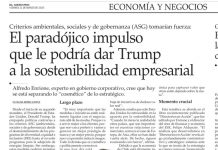Fuente: Ethical Boardroom
Autor: Gregory Price, Tax partner at Macfarlanes LLP
Do you ‘say what you pay with pride’? That was the challenge to companies set by a number of UK campaign groups during Fair Tax Week in July 2019, billed as a week of events celebrating organisations that are proud to pay their fair share of corporation tax.
Within this slogan there are two questions for company boards. First, do you know how much corporate tax your business pays in the jurisdictions where it operates? And, secondly, how do you communicate with stakeholders about the amount of tax that you pay?
For any directors struggling to answer those questions, now is the time to focus on building a sustainable approach to tax governance. That is particularly the case in a world where media and public scrutiny of corporate tax matters can lead to PR disaster for firms which are not on top of these issues.
Tax is a corporate governance matter
The starting point is to understand tax as a corporate governance matter. This would once have been a fairly radical proposition, but the attitude of tax authorities across the major developed economies has moved things on significantly.
In my home jurisdiction, the UK, the government and tax authority (HMRC) has introduced a range of measures which, when taken together, represent a drive to ensure that large businesses treat tax as a corporate governance matter. Recent initiatives include a requirement that large businesses publish (and update annually) a UK tax strategy, setting out the organisation’s approach to risk management and governance of its UK tax, attitude towards tax planning, the level of risk it is willing to accept in relation to UK tax and its approach to its dealings with HMRC. This sits alongside measures that impose corporate criminal liability for tax governance failings (where a business, regardless of its size, fails to prevent tax evasion in its supply chain) and personal liability for senior accounting officers whose businesses suffer tax reporting failures.
‘TO BUILD A SUSTAINABLE APPROACH TO TAX GOVERNANCE, DIRECTORS NEED A FRAMEWORK TO BRING IT ALL TOGETHER’
The UK is not alone in taking this approach. In Australia, large businesses are similarly encouraged to publish their tax strategy (through a voluntary tax transparency code) and to disclose and explain the amount of taxes that they have paid. The Australian Taxation Office has also produced a substantial ‘tax risk management and governance review guide’, which starts by acknowledging that ‘we have embraced the increasingly global view that tax risk management should be a part of good corporate governance’.
Similar measures have been adopted in other major economies and there is increasing activity in this area at an international level. In 2016, the OECD published a report entitled Co-operative Tax Compliance: Building Better Tax Control Frameworks with the stated aim of bringing more rigour to the co-operative compliance concept. Co-operative compliance – which includes the idea that responsible taxpayers should be able to police themselves on tax matters, without the need for tax authorities to intervene – is closely tied to the idea of a tax as a corporate governance matter. If a company has good tax governance, tax authorities should be content to give them space to resolve tax matters without intrusive audits. Data collected by the OECD suggests that an increasing number of tax authorities are adopting this approach in relation to large businesses.
Examples include the Japanese tax authority, which runs a programme that reduces the burden of tax audits for large companies that are assessed as having good tax corporate governance. For UK groups, a ‘business risk review’ rating determines the level of scrutiny it can expect – and a ‘low’ risk rating generally means less scrutiny. In the US, a number of large businesses are involved in the IRS Compliance Assurance Process, which offers the same incentive: a longer gap between audits for taxpayers who demonstrate high levels of transparency and cooperation. The IRS suggests that joining this programme ‘complements current corporate governance and accountability’.
Building a sustainable approach to tax governance Ethical Boardroom
Designing your approach
Tax is complicated. Groups need to cope with a bewildering array of domestic and international fiscal developments. To build a sustainable approach to tax governance, directors need a framework to bring it all together.
Those familiar with corporate governance matters in other contexts will know the value of a code, or a set of principles, for bringing coherence to the management of complex organisations. Examples are included in Table 1 above and Table 2 below.
Building a sustainable approach to tax governance Ethical Boardroom
However, the best-known corporate governance codes (such as the code for London-listed companies) do not say anything about tax. The Wates Principles, a UK code for the corporate governance of large private companies, produced recently by a coalition convened by the Financial Reporting Council, similarly contains no express mention of tax matters. I asked James Wates CBE, who chaired the coalition, about this. He said: “While the Wates Principles do not explicitly reference tax, I hope that they provide a useful framework that is relevant to all parts of a business, including its approach to tax. Articulating the company’s purpose is the first step in applying the Wates Principles, and in my view everything should hang off that. Board composition, directors’ responsibilities, managing opportunity and risk, remuneration and stakeholder relationships and engagement should all be guided by the company’s purpose. Tax is relevant to all of those and shouldn’t be thought of in isolation.”
Reflecting on that, the idea that corporate purpose and culture can inform a company’s approach to tax governance is a compelling one. Corporate purpose is disseminated from the top. Boards need to ensure a company’s purpose, its values, culture and strategy permeates through the business – including to the tax department. If the directors get that wrong, they will struggle to bring a coherent approach to tax governance. Both of the major UK corporate governance codes start by challenging the board to establish the company’s purpose, and that should be as applicable to tax as it is to anything else.
Guided by the corporate purpose, the next building block is ensuring the board can properly discharge its supervisory role in relation to tax matters – in other words, to demonstrate responsibility. Groups will need to show that there is somebody on the board who has enough knowledge of tax matters to provide effective oversight and to inform top level decision-making. That might be straightforward if the head of tax participates in board meetings, but where that does not happen companies need the right processes in place to ensure they have the necessary information to make proper decisions about tax matters.
A recurring theme in the approach of tax authorities in OECD member countries is to test whether top management are sufficiently involved in tax-related decision making and oversight. A responsible board is one that can demonstrate to tax authorities that it is taking the group’s tax affairs seriously.
Linked to this is the idea of ‘tax risk’. Boards must be able to show that they understand the group’s attitude to tax risk and have appropriate risk management procedures in place. These should be familiar ideas for directors: ‘audit, risk and internal control’ is one of the five areas of focus in the UK Corporate Governance Code. In addition, demonstrating a firm grip on tax risk can unlock relationships with tax authorities and thereby minimise tax-related compliance costs.
The final point is how the company communicates on these issues with its stakeholders, which the Wates Principles recognise as a core principle in itself (and a further aspect of corporate purpose).
Some stakeholders, often including employees, will take a direct interest in how a group approaches tax matters and whether, or how, that furthers the company’s purpose. Tax authorities, the wider body of taxpayers and society at large also fall within the expanding concept of stakeholders, which many companies now recognise.
Building a sustainable approach to tax governance Ethical Boardroom
Investor engagement on tax matters would once have gone little further than looking at a group’s effective tax rate – and perhaps querying whether a lower rate could be achieved. Not now. There has been a sea change in investor attitudes to corporate tax matters, exemplified by the Principles for Responsible Investment (PRI) recommendations from institutional investors on corporate income tax disclosure (see Table 3 right). Investors who adopt these recommendations require companies to put in place an appropriate tax governance regime and then to prove that it works by providing data on the firm’s tax practices. This is part of a wider investor-led project to raise the bar on environmental, social and governance (ESG) issues across investment portfolios. When it comes to tax, directors must recognise that this is an integral part of the company’s approach to governance and will be viewed as an expression of its corporate purpose. Tax is no longer a discrete subject than can be left to the specialists.
Some conclusions
Boards will recognise that tax needs to be treated as a corporate governance matter, and that governance codes provide an invaluable framework for building a sustainable approach. Reduced to its simplest, this can be expressed in three key conclusions.
First, directors must establish the company’s purpose, values and strategy and be able to explain how this is manifested in the company’s approach to tax matters. Secondly, tax is now a boardroom matter and responsibility must be allocated appropriately among senior management. Finally, stakeholder engagement is increasingly a core part of any approach to tax governance – and directors should expect investors to continue to raise the bar on this topic. Given the significance of that last point, campaigners may have hit the nail on the head when they challenge companies to ‘say what you pay with pride’.












